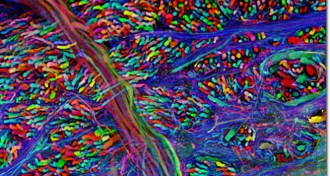
Trustworthy journalism comes at a price.
Scientists and journalists share a core belief in questioning, observing and verifying to reach the truth. Science News reports on crucial research and discovery across science disciplines. We need your financial support to make it happen – every contribution makes a difference.
All Stories by Science News Staff
-
 Astronomy
AstronomyCosmic jets re-created in a lab
Physicists have recreated in a lab the plasma jets that erupt from young stars and black holes.
-
 Health & Medicine
Health & MedicineDallas health worker is first to catch Ebola in U.S.
A health worker in Dallas has Ebola. She is the first to catch the virus in the U.S.
-
 Environment
EnvironmentWorld’s first full-scale clean coal plant now up and running
After decades of delays, technology that cuts carbon emissions from commercial power plants has made its worldwide debut.
-
 Health & Medicine
Health & MedicineFirst Ebola patient diagnosed in U.S. dies
Thomas Eric Duncan, who contracted the virus in Liberia and fell ill four days after traveling to Dallas, died October 8.
-
 Tech
TechMicroscopy techniques win Nobel Prize in chemistry
The award goes to three scientists who developed fluorescence microscopy, which allows researchers to see single molecules just a billionth of a meter across.
-
 Physics
PhysicsBlue light-emitting diode earns three researchers Nobel Prize in physics
The invention of blue light-emitting diodes has been awarded the 2014 Nobel Prize in physics.
-
 Neuroscience
NeuroscienceBrain’s map cells win three scientists Nobel Prize
The discovery of brain cells that provide a sort of “inner GPS” has been awarded the 2014 Nobel Prize for physiology or medicine.
-
 Neuroscience
NeuroscienceWhite House gives progress report on BRAIN Initiative
More pieces of President Obama’s ambitious BRAIN Initiative announced April 2013 have fallen into place.
-
 Health & Medicine
Health & MedicineEbola case identified in Dallas
The first case of Ebola to be diagnosed in the United States was announced September 30 in Texas.
-
 Planetary Science
Planetary ScienceFeedback
Readers discuss sources of stress in everyday life and tell us what they think about NASA's plan to nab an asteroid.
-
 Health & Medicine
Health & MedicineObama takes aim at antibiotic resistance
The White House offers an incentive for better diagnostics and calls for new meds and more stewardship programs against antibiotic resistance.
-
 Tech
TechLong after JFK assassination, gunshot forensics still limited
The Warren Commission Report included the results of a neutron activation analysis test of Lee Harvey Oswald. But even that high-tech analysis can't distinguish the type of weapon fired.